As the heatwave intensifies and Christmas draws nearer, Johannesburg Water says it cannot promise that there won’t be any disruptions to the water supply during the holiday season.
This is because there are unforeseen problems like burst pipes. However, Johannesburg Water does ensure homeowners that the company attempts to respond to service delivery issues as timeously as possible,” said spokesperson Nolwazi Dhlamini.
Many residents of Turfontein have been dealing with an intermittent water supply since the start of the year, so having water flowing continuously from their taps is a pipe dream.

According to some locals who spoke to Sowetan, they had gone a week without water and wouldn’t be shocked if their taps were dry for Christmas.
The inability to follow a tight hygiene routine, the inconsistencies of the water takers in the region, and the difficulty of having to pay for the water they don’t get were other factors that exacerbated their dissatisfaction.”
“I would receive an R1,000 water bill, but I would go without water for half the month.” I pay for that, but I also purchase water because the tankers are not dependable,” Casper Sibanda, a resident, said.
“In the streets, we observed leaking pipes; water is running down the street, but our taps are dry and we are in pain. Our children can’t bath, you can’t cook. I won’t be shocked if they were to say there’s no water during Christmas.”
Another local, Lorraine Makgethe, claimed that although the city had supplied water tankers to the region, they were erratic, which annoyed her. “If they are coming, I will be at work when they do. Days would pass before we saw one. When one passes by, others sometimes fill them with their buckets, which is like a shock,” she remarked. “We were almost without water for a whole month at one point. I mean, I was telling my kids, There’s no water for half the year. Consider a four-person household taking a bath with water from a two-litre bottle. After my son exits the tub, I take a bath in the same water that he used.”

“In addition to being unjust, it is also expensive. We still have to pay the water bill even though I refill five 2L bottles for R10 at least three times a day.”
Johannesburg Water blames population growth, budgetary restrictions, and outdated infrastructure for the water crisis.
Areas like Brixton and Crown Gardens must deal with sporadic timetables, while Turfontein is the most severely affected.
According to a Brixton businessman who wished to remain unnamed, the councilman informed them that there would be no water this weekend.
“There would be no water for the entire weekend, the councillor announced in the group chat. I now have to go get buckets of water from my Jojo tank at home and carry it to the restaurant,” he remarked.
“There was a period when we nearly went a month without water. After all, I spent half the year telling my kids, There’s no water. Picture a family of four taking a bath with water from a two-litre bottle. I take a bath with the water my son used to bathe in after he exits the tub. It is not only unjust, but it is also expensive.
“I fill up five 2L bottles for R10 at least three times a day, and we still have to pay the water bill.”
Joburg Water blames the water crisis on population increase, financial constraints, and old infrastructure.
While Turfontein is the most severely affected, Brixton and Crown Gardens are also affected by sporadic schedules.
A merchant from Brixton who wished to remain nameless stated that the councillor had informed them that there would be no water this weekend.
“There would be no water for the entire weekend, the councillor announced in the group chat. I have a Jojo tank at home, so I have to go get water in buckets and carry it to the restaurant.”
Ntshavheni Mukwevho, the CEO of Johannesburg Water, stated earlier this week that the city needed R3.1 billion a year for the next ten years to upgrade its infrastructure, which is behind schedule by R27 billion.
In order to address the situation, the water body has subsequently suggested fixes, including fixing leaking reservoirs, constructing new facilities, and addressing unauthorised water connections.
Only eleven of the approximately forty-two leaky reservoirs that have been found are being repaired, according to Johannesburg Water.


